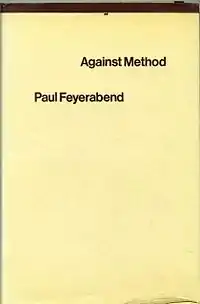Against Method
Against Method: Outline of an Anarchistic Theory of Knowledge is a 1975 book about the philosophy of science by Paul Feyerabend, in which the author argues that science is an anarchic enterprise, not a nomic (customary) one.[1] In the context of this work, the term anarchy refers to epistemological anarchy.
 Cover of the first edition | |
| Author | Paul Feyerabend |
|---|---|
| Language | English |
| Subjects | History of Science Epistemology |
| Publisher | New Left Books |
Publication date | 1975 |
| Media type | Print (Hardcover and Paperback) |
| ISBN | 0-902308-91-2 |
Content
Feyerabend divides his argument into an abstract critique followed by a number of historical case studies.[2]
The abstract critique is a reductio ad absurdum of methodological monism (the belief that only a single methodology can produce scientific progress).[3] Feyerabend goes on to identify four features of methodological monism: the principle of falsification,[4] a demand for increased empirical content,[5] the forbidding of ad hoc hypotheses[6] and the consistency condition.[7] He then demonstrates that these features imply that science could not progress, hence an absurdity for proponents of the scientific method.
The historical case studies also act as a reductio.[8] Feyerabend takes the premise that Galileo's advancing of a heliocentric cosmology was an example of scientific progress. He then demonstrates that Galileo did not adhere to the conditions of methodological monism. Feyerabend also argues that, if Galileo had adhered to the conditions of methodological monism, then he could not have advanced a heliocentric cosmology. This implies that scientific progress would have been impaired by methodological monism. Again, an absurdity for proponents of the scientific method.[9]
Feyerabend summarises his reductios with the phrase "anything goes". This is his sarcastic imitation of "the terrified reaction of a rationalist who takes a closer look at history".[10]
Scholarly reception
Some have seen the publication of Against Method as leading to Feyerabend's isolation from the community of philosophers of science, who objected to his view that there is no such thing as the scientific method.[11]
Editions and translations
The first edition of Against Method went through several reprintings until the revised (second) edition came out in 1988. A further revision produced a third edition in 1993. The most recent edition, the fourth, was published by Verso Books, in 2010, with a new introduction by Ian Hacking.
A French translation by Baudouin Jurdant and Agnes Schlumberger was published by Éditions du Seuil in 1979, as Contre la méthode : esquisse d'une théorie anarchiste de la connaissance. ISBN 2-02-005370-5
The German translation by Hermann Vetter was abridged and reworked by Feyerabend, whose native language was German. It was published by Suhrkamp Verlag in 1983 as Wider den Methodenzwang. Skizzen einer anarchistischen Erkenntnistheorie. This translation went into a paperback edition in 1986, as part of the suhrkamp taschenbuch wissenschaft series, and has been reprinted several times.
A Dutch translation by Hein Kray was published by Boom in 1977, with the title In strijd met de methode. In 2008 a new translation by Marjolijn Stoltenkamp was published, as Tegen de methode.
References
- Feyerabend, Paul. Against Method. 4th ed., New York, NY: Verso Books, 2010, p. 1.
- Feyerabend, Against Method, 4th ed., p. 7.
- Lloyd, Elisabeth. "Feyerabend, Mill, and Pluralism", Philosophy of Science 64, p. S397.
- Feyerabend, Against Method, 4th ed., p. 45.
- Feyerabend, Against Method, 4th ed., p. 27.
- Feyerabend, Against Method, 4th ed., p. 8.
- Feyerabend, Against Method, 4th ed., p. 17.
- Lloyd, "Feyerabend, Mill, and Pluralism", p. S397.
- Feyerabend, Against Method, 4th ed., p. 116.
- Feyerabend, Against Method, 3rd ed., p. vii
- Preston, John, Feyerabend: Philosophy, Science and Society, p. 7
Further reading
- The first, 1970 edition, is available for download in pdf form from the Minnesota Center for Philosophy of Science (part of the University of Minnesota). Follow this link path: Minnesota Studies in the Philosophy of Science > 4. Analyses of Theories & Methods of Physics and Psychology. 1970. Editors: M. Radner and S. Winokur > Open Access > Under the "Whoops!" message click 'Download' From the resulting file '4_Theories&Methods.zip' you need the three Feyerabend sections, 4_2_1_Feyerabend.pdf, 4_2_2_Feyerabend.pdf, 4_2_3_Feyerabend.pdf and the immediate following article on A Picture Theory of Theory Meaning (sic) (4_3_Hanson.pdf) in order to get the complete set of footnotes.
- Discussion of the book in John Preston, "Paul Feyerabend", The Stanford Encyclopedia of Philosophy (Winter 2009 Edition), Edward N. Zalta (ed.), URL = <http://plato.stanford.edu/archives/win2009/entries/feyerabend/>
- Paul Tibbetts, Tomas Kulka, J N Hattiangadi, "Feyerabend's 'Against Method': The Case for Methodological Pluralism", Philosophy of the Social Sciences 7:3 (1977), 265-275. DOI 10.1177/004839317700700306